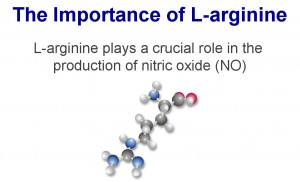L-arginine Research
In a recent study at Columbia University, researchers called l-arginine the “magic bullet for the cardiovascular system.” Below you’ll find the latest research detailing what l-arginine can do for you. |
Correction of endothelial dysfunction in chronic heart failure: additional effects of exercise training and oral L-arginine supplementation
J Am Coll Cardiol, 2000; 35:706-713Rainer Hambrecht, MDa, Lutz Hilbrich, MDa, Sandra Erbs, BSca, Stephan Gielen, MDa, Eduard Fiehn, MDa, Nina Schoene, MDa and Gerhard Schuler, MDa
40 patients with severe chronic heart failure were divided into groups to test the effects of L-arginine on vasodilation. The goal was to analyze whether L-arginine has comparable or additive effects to physical exercise. After four weeks of observation and study, researchers concluded that the effectiveness of L-arginine on vasodilation was similar to that of regular exercise, and that when exercise and L-arginine supplementation are combined, the effects are even greater.
Differential inhibition of human platelet aggregation and thromboxane A2 formation by L-arginine in vivo and in vitro
Naunyn-Schmiedeberg’s Archives of Pharmacology. Volume 357, Number 2, 143-150.S. M. Bode-Böger, Rainer H. Böger, Andrea Galland, Jürgen C. Frölich
In a study of 20 healthy male volunteers, researchers used L-arginine and a placebo to determine the effects of L-arginine on platelet aggregation and thromboxane A2 formation in vivo and in vitro. The results indicated that the L-arginine/nitric oxide pathway is present in human platelets as a Ca2+-dependent anti-aggregatory pathway, and that in vivo the formation of nitric oxide from L-arginine by endothelial cells may contribute to these platelet-inhibitory effects.
L-arginine in the management of cardiovascular diseases
The Annals of Pharmacotherapy: Vol. 35, No. 6, pp. 755-764. DOI 10.1345/aph.10216JW Cheng, SN Baldwin, and SN Balwin
An in-depth look into five decades’ worth of l-arginine studies shows that l-arginine improves the management of multiple cardiovascular diseases. It has been demonstrated that intravenous L-arginine augments endothelial function by enhancing vasodilation and reducing monocyte adhesion, while oral supplementation demonstrated similar effects as well as improvement of exercise ability in patients with cardiovascular diseases.
L-arginine supplementation improves exercise capacity after a heart transplant
Am J Clin Nutr. 2010 May;91(5):1261-7. Epub 2010 Mar 3.Doutreleau S, Rouyer O, Di Marco P, Lonsdorfer E, Richard R, Piquard F, Geny B.
Researchers compared the exercise capacity in healthy subjects and heart transplant patients and investigated whether L-arginine supplementation might improve exercise capacity after a heart transplant. Subjects performed a 6-minute walk test and a maximal bicycle exercise test before and after a 6-week period of placebo intake or L-arginine supplementation. Unlike with the placebo intake, six weeks of L-arginine supplementation improved quality of life in heart transplant recipients—their submaximal exercise capacity increased, as did their distance walked during the 6-minute walking test.
L-arginine given after ischaemic preconditioning can enhance cardioprotection in isolated rat hearts
Eur J Cardiothorac Surg 2001;19:873-879.Yoshihiro Suematsua, Toshiya Ohtsukaa, Yasunobu Hiratab, Katsuhide Maedaa, Kazuhito Imanakaa, Shinichi Takamotoa
Isolated rat hearts were prepared and divided into six groups and treated with L-arginine to determine the effects on coronary flow. Nitrites and nitrates were measured 5 and 60 minutes after reperfusion, and infarct size was also determined. Results showed that enhancement of the effects of ischaemic preconditioning can be achieved with L-arginine, a precursor of nitric oxide, improving post-ischaemic functional recovery and infarct size in the isolated rat heart.
Link to the Research
Or call Boyd Lynn Gerber or Debra Gerber
(801) 849-0213
gerberb@zenez.com
We ship to almost anywhere in the world!

Leave a Reply